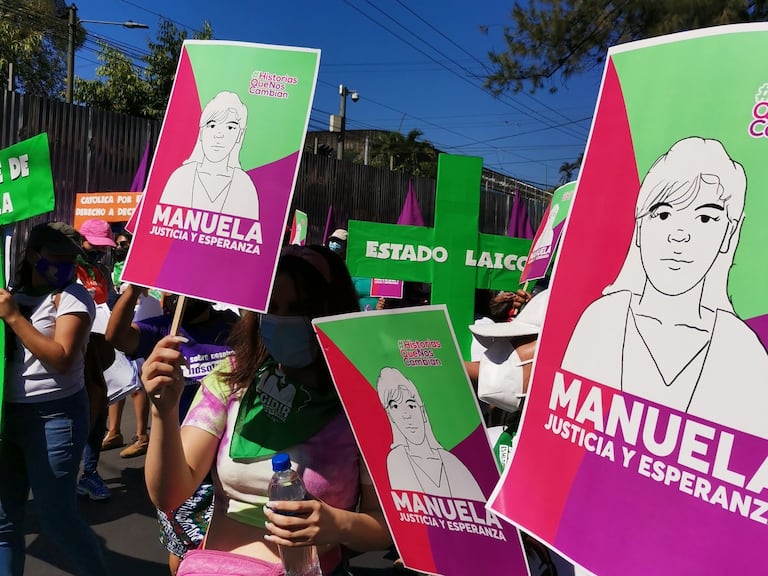Salvadoran women remember and demand justice for Manuela in the March 8 march. Feminist Collective
Manuela arrived at a hospital in El Salvador almost crawling on the ground and left there handcuffed and straight to a jail.
He was 31 years old and was begging for medical attention after going to the bathroom in his house - it was actually a latrine a few meters from his home - and fainted.
She had had an obstetric emergency and was sentenced to 30 years in prison under the crime of aggravated homicide.
She was jailed in 2008 and two years later, in 2010, she died of cancer.
His case is being studied by the Inter-American Court of Human Rights, which this Wednesday and Thursday will listen to his family and the Salvadoran State.
For the first time, the Inter-American Court will have the opportunity to recognize that denying and penalizing basic health services are acts of discrimination and violence against women who have problems during pregnancy.
The agency's pronouncement will serve as a compass for all countries that are part of the inter-American human rights system.
Manuela - the family has asked not to reveal her real name to protect her memory - was the victim of a state used to persecuting women who abort, even when it is involuntary.
The medical personnel who received her did not treat her, denounced her and accused her of provoking an abortion to hide an infidelity.
Manuela could not defend herself.
Neither her obstetric emergency nor the lymphatic cancer that was already beginning to deteriorate her health were taken into account.
"The State did not provide him with a diagnosis or appropriate treatment for the cancer he suffered, and that was one of the causes of the emergency he suffered," says Catalina Martínez Coral, from the Center for Reproductive Rights, an organization that together with the Feminist Collective present their arguments in favor of Manuela before the Court.
This is the last stage of the case, four years after the Inter-American Commission on Human Rights admitted it after determining that the Government of El Salvador did not provide access to justice for her or her family.
“The Commission determined that the State violated the right to personal liberty due to the illegal detention of the victim, taking into account that she was detained on February 28, 2008 under the figure of flagrante delicto without meeting the requirements for it, since in at the time of the arrest he was in the National Hospital of San Francisco Gotera ”.
The IACHR also concluded that “the State violated the right to life, the right to health, judicial guarantees and judicial protection, taking into account that the victim did not receive a comprehensive medical diagnosis when she was deprived of liberty -in the first months of detention, he lost 13 kilos-, nor did he receive timely and adequate medical treatment, which would have allowed Manuela's life to be prolonged, who died after suffering from a disease whose signs had been manifested since 2007. The death of the victim, in the custody of the State, it was not clarified through an adequate investigation, ”the IACHR pointed out when it presented the case to the Court.
“It is not a question of determining his innocence but the responsibility of the State.
Doctors cannot be prosecutors, criminal proceedings must have guarantees and they did not have them, ”says Martínez Coral.
Manuela had two children and her third pregnancy was progressing, she never wanted to have an abortion, she was ill and was imprisoned and separated from her family, which this Thursday is presented through a video at the hearing.
His mother, now over 80 years old, has been seeking justice since 2008.
It was she who took her daughter to the hospital, dying after involuntarily expelling the fetus.
Since they lived in a rural area, she had to pay a neighbor $ 60 - a fortune for them who had no money - to transport them for a road of almost three hours to San Salvador.
She was urged to see a specialist, but they met with doctors who acted as prosecutors and denounced her.
“Those who received her should not have found her guilty without even examining her.
They did not suture his wounds from the tear he suffered, nor did they give him a pill.
They interrogated her before attending to her emergency, ”says Martínez Coral.
Morena Herrera, an activist with the Citizen Group for the Decriminalization of Abortion in El Salvador, has said that they hope the Court will order financial reparation for Manuela's family and medical and psychological treatment for her two children.
The organizations that have accompanied the case also hope that the result in this process will allow the State to be ordered to establish regulations that guarantee the sexual and reproductive rights of women in a country where an obstetric complication is a crime that is paid up to with 50 years in jail.
Subscribe here to the EL PAÍS América newsletter and receive all the information keys on the region's current affairs

